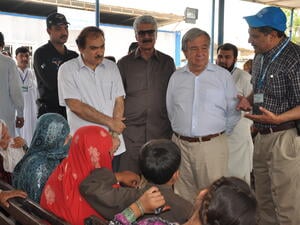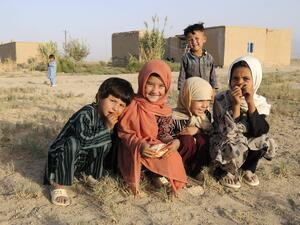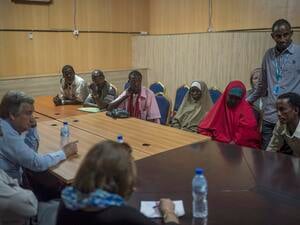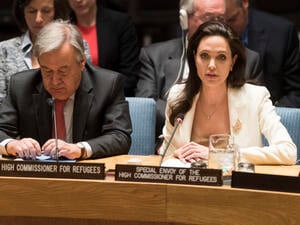High Commissioner wraps up mission to Egypt, presses on to Kenya
High Commissioner wraps up mission to Egypt, presses on to Kenya
High Commissioner António Guterres wrapped-up yesterday evening (Thursday) a two day mission to Egypt during which he evaluated UNHCR's humanitarian response to the displacement crisis triggered by the fighting in Libya.
The critical humanitarian situation inside Libya remains a concern for UNHCR as thousands of people could be trapped in areas where fighting is taking place. UNHCR hopes it will be able, as part of the overall UN humanitarian response, to gain full humanitarian access to people inside eastern Libya in the coming days.
In his meeting with Egyptian Prime Minister Dr. Essam Sharaf, the High Commissioner thanked Egypt for keeping its borders open to all those fleeing Libya at a time when Egypt is dealing with its own complex changes.
According to our team at the Sallum border crossing, movement across the Libya-Egypt border has slowed. Yesterday, a number of Libyan families from Brega and Benghazi arrived at Sallum following advances by Libyan government troops. Many reported fleeing battles between rebels and government forces.
More than 161,000 people have crossed this border since mid February, including some 83,000 Egyptians and 32,000 Libyans.
Today High Commissioner Guterres is in Kenya to draw attention to the plight of the hundreds of thousands of Somali refugees and review UNHCR's operations.
On Sunday, and accompanied by Executive Director of the World Food Programme (WFP) Josette Sheeran and Executive Director of UN Women Michele Bachelet, he will visit the complex of refugee camps in Dadaab in northeastern Kenya, the largest refugee settlements in the world. Dadaab currently hosts more than 320,000 refugees, the vast majority being Somali nationals.
The complex, consisting of three camps, was set up in 1991 and 1992 following the collapse of the government of Siad Barre in Somalia and was initially designed to accommodate some 90,000 refugees. Acute overcrowding of the three existing camps - namely Ifo, Dagahaley and Hagadera - continues to be a major concern to the Government of Kenya and UNHCR.
Living conditions in these camps have been deteriorating as the refugee population grows. Capacities of all the existing facilities and services are stretched to limits. With the recent escalation of violence and renewed clashes in Somalia, some 2500 new arrivals are being registered in Dadaab every week. This year alone Dadaab received more than 30,000 new arrivals.
A camp extension at Ifo has been constructed and it was envisaged that the relocation of some 40,000 refugees would begin in November last year. However, the scheduled relocation and further development of infrastructure were suspended due to security concerns on the part of the Kenyan authorities.
Our discussions with the government over decongestion of the over-crowded camps are continuing and we are hoping for a positive outcome. The infrastructure of the new camp already includes schools, health facilities, communal centres, water supplies, sanitation and shelter facilities.
During his mission to Kenya the High Commissioner will also look into the protection of Somali refugees and UNHCR's support to the Government of Kenya and local communities hosting refugees.
For further information on this topic, please contact:
In Egypt (on mission): Melissa Fleming on mobile +41 79 557 91 22







